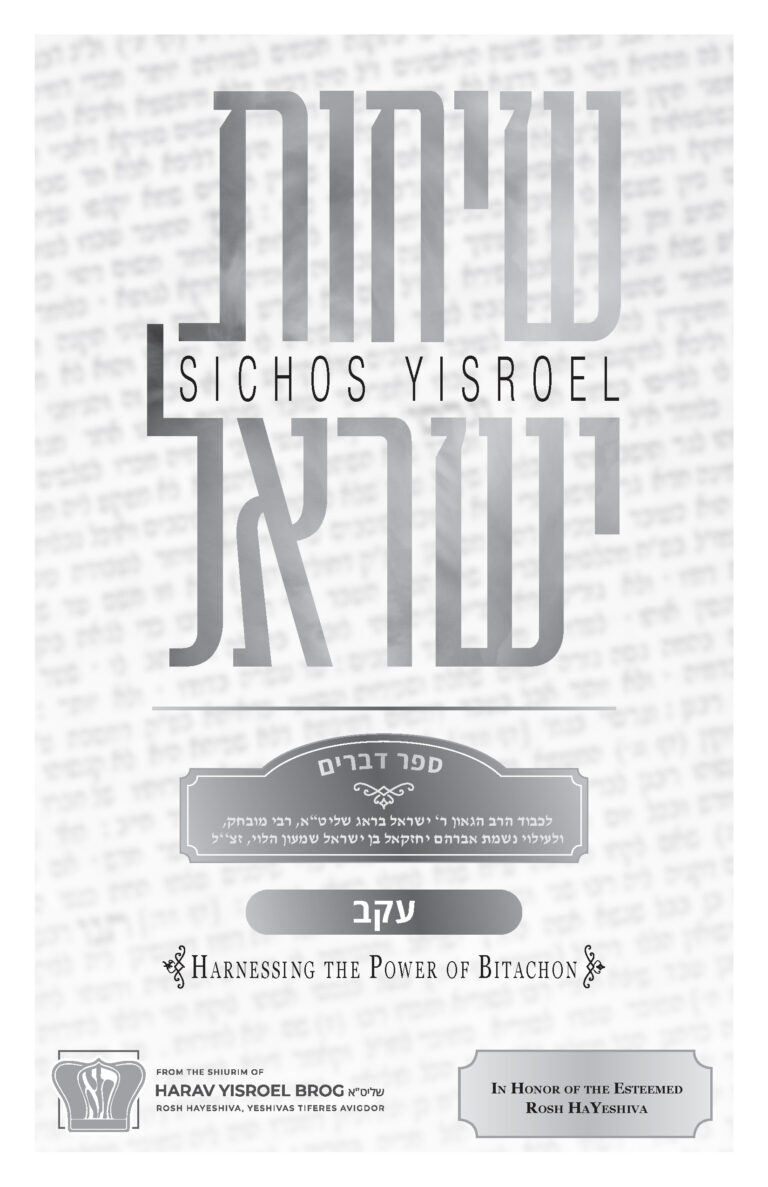Re’eh 5782 – Tzedakah: Realigning Our Hearts
Sponsored
l’ilui Nishmas R’ Zev Ben Moshe Dov
Consider sponsoring a shiur
Visit YTATorah.org
Shiur presented in 5781
Parshas Re’eh: Tzedakah: Realigning Our Heart (5781)
Diminishing Resources
In this week’s parshah, we encounter the mitzvah of tzedakah. Tzedakah is something that everybody is familiar with. In all the shuls, people are collecting tzedakah. It is collected everywhere; on the streets, in newspapers, by phone, and through many other mediums and venues.
Now, many people might make a mistake and think that tzedakah is for rich people. They may think that when they give a little tzedakah in the shul, they should not expect tremendous returns. They never sit down and think, “How am I doing in my tzedakah department?” Tzedakah is a great opportunity that Hakadosh Baruch Hu gives us, like it says in this week’s parshah כי בגלל הדבר הזה, if a person will give tzedakah Hakadosh Baruch Hu will bentch him, Hakadosh Baruch Hu will give him brachah בכל מעשיך ובכל משלח ידך (Devarim 15:10).[i] That’s an amazing brachah: “In all of your assets, in all of your investments” you will see brachah!
The Chafetz Chaim wrote a sefer called Davar Be’ito. It’s not such a famous sefer, but it’s one of the sefarim that he wrote. The Chafetz Chaim points out that if you ask most people about their conduct regarding their expenditures, their physical needs, whether they conduct themselves like a well-to-do person, like a person of means, or even like someone above their means, you will get an interesting answer. For example, if you ask a fellow about his automobiles, you will find out that a lot of people nowadays have two cars, usually, one sedan and one minivan. People drive either Sienna or Odyssey as minivans. Poor folks drive cheap cars, like Chryslers. The rule is what people like, for that they spend their money. If you go to most people’s homes and you look at their kitchens, you’ll see that they have very nice kitchens. Not simple kitchens. You look at the flooring in the house, or the windows, or at all the other stuff – you’ll often see top of the line appliances and home furnishings.
But let’s say you ask this same person: “Excuse me, can you please help me? I see you’re a well-to-do fellow. You bought yourself a new house, some new cars. You’re going on vacation. How about helping me out with some tzedakah?” Then the person tells you, “The emes is, I’d love to help you but I really can’t. I can’t afford it.” So you tell him again, “But you are living so nicely?” And he’ll answer, “You’re right. But if I gave my money away to tzedakah, I would be diminishing my family’s needs and that’s something that I can’t do.”
Says the Chofetz Chaim, when it comes to tzedakah and chessed, a person feels that is the place where he should scrimp and save his money for his family. Over there he starts to look at life differently. He feels he can’t afford it, and he makes himself into a poor person and doesn’t give tzedakah even according to his ability.
The Unfair Deal
The Chafetz Chaim says if you want to get an idea of how Hashem views this, listen to the following story. There were two partners, Reuven and Shimon. They bought a business together and they invested in the business. They stipulated between themselves that they would each take out whatever they needed from the business for immediate needs – such as food for their families, and clothing, and they would leave the rest inside the business to reinvest and build up the business. And later on, when they sell the business, they would share the profits. It started off very nicely, but eventually the business started going down and down. They both couldn’t take out their weekly basic expenditures from the business, and they felt very sad that they were going to have to scrimp on their physical needs for their home, since there was only enough money for their bare necessities.
One day Shimon comes to Reuven and says, “You run the finance of our business. I need some money. I’m pashut desperate. I have no money.” Reuven said, “I’m sorry. There’s no money to give, even your basic needs are more than what the business could provide. I wish there was money. There’s no money.”
Shimon starts to do a little research, and he finds out that Reuven – the guy who is running the finances – his life has not changed at all! He is still living on the same level that he did before. Only for Shimon, his shutaf, did he make sure to tell him, “Nebach, we don’t have the money.” So Shimon got wind of this and he came to Reuven and told him, “What a liar you are! Why did you fool me?! What did I do to you that you tricked me and fooled me? You stole from me. You squeezed me. You left me without anything and you yourself are taking care of yourself and your family very well!”
The Chafetz Chaim says that every person has a shutfus, every person has two parts to themselves. He has a guf that needs physical things and then he has a nefesh, a neshamah that needs spiritual things. Each one has their own unique set of needs to succeed and live, and they have to divide the kochos between both of them. Now, you have to spend time on feeding the guf and you have to spend time on taking care of your neshamah. You have to take care of your future, your olam haba.
Splitting the Pot
Now, who is in charge of this shutfus? Hashem put two forces in charge of this shutfus, the yetzer hara and the yetzer tov. The yetzer hara is in charge of a person’s physical needs; he makes sure that a person has as many physical needs that he can get. And the yetzer tov is in charge of the nefesh. He tells the nefesh to take care of itself and put away accomplishments for the future.
The Chofetz Chaim says in these times, when people’s parnasah is not at its best, automatically the guf will have less to enjoy and the neshamah will have less to spend on neshamah needs, and one will have to give less tzedakah. But a person has to use his seichel and split the pot for himself appropriately. However, lema’aseh you see that it doesn’t happen like that. Lema’aseh the guf – or the person in our example – is still eating like he always ate. You see a lot of poor people who don’t look like they’re “disappearing.” They look very well fed. You tell a guy, “What about the Torah and the mitzvos? Why are you scrimping on tzedakah?” He says, “I can’t. For that I have no money.” So he takes care of himself and he steals from his neshamah, says the Chofez Chaim.
Now, if you would split it and share the expenses, it wouldn’t be so geferlech, but the yetzer hara is never going to let you do that. He’ll tell you, “For your guf you make sure you take 100%. Everybody else has vacations, you also need vacations.” And a person is really supposed to do the right thing, but the yetzer hara guides us to do the wrong thing. A person who is a chacham, says the Chofetz Chaim, should not listen to his yetzer hara and he should do what’s proper. He should say, “If I don’t have a lot of money, I’m not going to make extra expenditures at the expense of my tzedakah, or at the expense of my chessed.” And if he’ll do that, then he’ll be conducting himself in the right fashion.
Where is Your Heart?
Have you ever heard questions about tzedakah? “Rabbi, could I take it off of ma’aser?” Everybody is petrified to give maybe an extra penny for tzedakah. They want to know if they could deduct it. But when it comes to spending money on pizza, on shopping, no one asks if it’s deductible. You don’t care if it’s deductible. “Is there something I want? Is there something I like? Is there something I indulge in?” That’s what is on everybody’s mind.
Because of how today’s world runs, the whole world is one small village. Once upon a time, if you lived in a village, you didn’t know what was going on in the big city or anywhere else, and you for sure didn’t know anything about Eretz Yisrael. Today, we know about Eretz Yisrael like it’s our backyard. When it comes to dealing with aniyim, the pasuk teaches us the following lesson. The Torah tells us that if there’s going to be an evyon, if there’s going to be a poor person in one of your cities, לא תאמץ את לבבך;the first step in not giving tzedakah is hardening your heart and not allowing yourself to analyze, to study and to think.
The Torah says לא תאמץ את לבבך, a person should not harden his heart. When you want to give tzedakah and you want to think about your tzedakah portfolio, the approach has to be, “Where is my heart?” Let’s say you go into a shul in Eretz Yisrael. I just came back from Eretz Yisrael. It’s very common in Eretz Yisrael that people come collecting during davening. Not one, not two, not three. It could be between ten and fifteen people. Now, if you look around you’ll see that there are certain people who come prepared. They bring a stack of money. They put it down next to their tallis zeckel and they’re prepared to start doling out the money. It’s not major money but, it’s still something. And then there are those people who ke’eilu never heard of money. “What do you want? Money? I don’t have any money here. Money? Why do you think I have money? I’m probably poorer than you.” That’s how it is.
What Goes Around Comes Around
I noticed an amazing thing among my peers when I was a young bachur in yeshiva. If somebody came over with $20 and he said to you, “Do you have change?” You know what the most common response was? “No.” Like, you suspect that I would have change of $20? Now $20 is not a lot of money. Why is the first reaction, no? And I’ve heard different comments throughout my life. Some say, “If I had change of $20, you think I’d be sitting here? I would be in the pizza shop buying ice cream. I wouldn’t be sitting here.” So the automatic reaction is no. That’s because your hearts are in a difficult, hardened place and you’re over לא תאמץ את לבבך. When somebody has a need, people just can’t relate to that. Your first answer has to be yes. If you see fifteen aniyim coming into the shul, you have to think I have fifteen opportunities to assist others. Now, whether I can or I can’t, that’s a different story. But the first thing you have to ask yourself is, what do you want.
In Lakewood, the same thing happens. They come to every shul. So the first thing that has to be going through your mind is, “I want to give tzedakah.”
Now, just because you want to give doesn’t mean you will give. It also says: ולא תקפץ את ידך מאחיך האביון, don’t close your hand from your brother, a poor person (Devarim 15:7). What happens if people come to the shul and you’re one of those cheapskates who resents people asking you for tzedakah? Now, of course you say they disturb your davening. You make up all kinds of stories. But I was very impressed when I was in Eretz Yisrael and in Lakewood, as well. They came before Yishtabach and they came later on. They didn’t disturb anyone during krias shema, or in the middle of shemoneh esrei.
So here is a person who resents being asked for tzedakah. You know what Chazal tell us? Rashi, on the pasuk ולא תקפץ את ידך מאחיך האביון quotes a Midrash that says an amazing thing: אם לא תתן לו, if you do not give that person a donation, סופך להיות אחיו של אביון, you’re going to be just like him, and just like he’s an evyon, you’re going to end up being an evyon.[ii]Do you know how powerful this message is? If you give tzedakah it says בגלל הדבר הזה (ibid), Hashem will be mevarech you, but if you don’t give, Hashem is going to put you in the same class as that ani. Who knows how many of these aniyim started out being regular people and they didn’t like people coming and bothering them for tzedakah? So now they became part of the club, and now they’re forced to go around raising funds. I don’t know of anybody who looks forward to being part of that club and raising funds.
Make a Cheshbon: Can I Afford This?
This is a lesson I learned from my rebbi. My rebbi (HaRav Meir Soloveichik, zt”l) never left his house without filling his pockets with a stack of coins, a nice big stack. There were times that he left his house and he went back to get money because he forgot to take the money. He didn’t carry money on him stam. A person has to think about this: where is my heart and where are my hands?
Now, the emes is that some people are not able to give a few bucks. A person should make a cheshbon. Let’s say a person is one of these guys who has been giving a nickel since he was 15. His father told him forty years ago, “I give you permission to give a nickel,” so he has permission for a nickel. He never reconsidered even after he got married, even after he made money. To give a nickel, you’ve got to be such a cheapskate! I mean it’s like לא יאומן כי יסופר. A nickel is not a shaveh prutah! And there are people that don’t shemzach to give a nickel! They’re not embarrassed to give a nickel. That’s embarrassing. That’s not called giving tzedakah.
Now, a person should make an assessment, “What can I give? What can I afford?” Are you not able to afford a dollar a day? Is that too much to give a dollar a day? I don’t think it’s too much for the average person. You go in and you buy a Danish for $3 or you buy a nice muffin. How much are they? $2.99 for a muffin?! That’s a silly cupcake. It should be 99 cents. And you don’t hesitate. You say, “I’ll take two. I’ll take the blueberry and I’ll take the cinnamon apple.” That’s what you say. One for now and one for later. You don’t say, “My father told me to buy it for a dime and that’s what I do.” You upped your game. So a person has to think about this. It’s so important because you have no shaychus to tzedakah if you’re not doing this. Make an assessment of what you can give. “What can I afford?” Then you’ll know that every day you’ll be working on opening your heart to others and working on giving to others. And with that, you’ll bring yourself tremendous brachah.
Who Are You Really Giving To?
It’s amazing. I’ve seen people spend fortunes of money on fixtures in their homes. Fortunes for simple fixtures. It doesn’t make a difference if it’s fancy or not fancy. When it comes to tzedakah, somehow they get nervous. I saw in Rav Chaim Palagi, where he says that whenever a person is coming to give tzedakah, he should first ask himself, “What do I spend on my aretz?”What do I spend on my real estate? What do I spend on my earthly needs? The biggest mistake is you’re not giving that money to an ani. When you are giving money to an ani, you’re giving the money for your own self, to be gebentched, for you to have hatzlachah and brachah and not klalah. You had no qualms about giving the money for a silly-looking sink. I went to a guy and I said, “How much did you pay for this sink?” He paid $1200 for the sink. He bought one for himself and one for his wife. I told the guy, “You’re a fool.” And that was without the faucets. He paid a fortune. People make this mistake and it’s a very costly mistake, and then they complain later on. Here’s a lady who’s complaining that she doesn’t have enough money to send her kids to camp. She doesn’t have enough money to go on vacations. That’s because she was not willing to have a heart and an open hand for others. It got her into tremendous need.
Leaving the World Smiling
There was a yungerman who used to come here every single year, a talmid chacham, an amazing ba’al chessed, a personality of personalities, one of the nicest, thoughtful, conscientious people I’ve ever met, a very special fellow. He was on the phone with his wife on Erev Shabbos Chazon and he was telling her that today is Shabbos Chazon, “It’s a big Shabbos. So be mekabel Shabbos ten minutes earlier today for the zechus of our family.” She said, “Sure. Of course I’ll do it. If you ask.”
He was in America and she was in Eretz Yisrael. They were talking on the phone. Suddenly, he stopped talking, so she thought that maybe he fell asleep, and she called the house number that he was staying in. The lady of the home answered the phone after an hour of ringing and the lady from Eretz Yisrael said, “Can you please tell me if my husband came up from downstairs.” She said, “No.” The Israeli lady said, “Could you please go check on him?” She went down and she opened the door a crack. She came back and said, “He’s resting with a beautiful smile on his face.” A little while later, her husband came home. The wife said, “Could you please go down and check how Rav Avraham Yeshayah is doing?” He went in, and he was still smiling. He called Hatzalah right away. Rav Avraham Yeshayah had died with a smile on his face, Erev Shabbos kodesh. That is how he died.
He was a man who affected the lives of so many people! He was a very poor man. He had a lot of chovos, and he was extremely honest about paying up his chovos. People told him all kinds of eitzos of how to get out of debts. He said, “I’ll sell the shirt on my back to pay up my chovos.” He sold the apartment that he owned in Yerushalayim to pay up his debts. He moved into a tzedakah apartment. They have what’s called hekdeshos, tzedakos in Eretz Yisrael that own some old apartments and they rent them out at low cost to needy people for two years at most. They don’t care what the story is. When two years are up, you must leave that apartment. Somebody else is coming in. There’s a line for them, you understand. He had this apartment for the past year, and he was collecting in America to try to get his family into another apartment. He wasn’t a major success at collecting. It wasn’t his thing. But he was so happy. צהלתו בפניו, he only had good words to say to everyone. It was a heartbreaking event. I went to his levayah in Eretz Yisrael. It was a heartbreaking levayah. A young man, 55 years old. A rachmanus. He loved Torah. He had a chiyus from Torah.
His wife told me that he used to bring back the paper that he wrote when he listened to our shiur. He used to bring it back to Eretz Yisrael and show it to his wife. Then he would put it away in a file and say, here is where I keep the shiurim that I heard in America. Somebody would say to him, “You came to America to hear shiurim? Why don’t you collect money?” He was an unbelievable person.
Now they have no apartment. The almanah is alone with the children. They have a total of ten children. Not all of them are married. It’s a heartbreaking situation. It’s so sad. They started to make a collection the next day. And then after a week what happened? Another person from Bnei Brak, 46 years old, dropped dead. He died leaving a bunch of kids. So all of a sudden last week’s almanah becomes pushed to the side. They hadn’t reached their goal yet.
A person has to know there are unique, amazing opportunities to get zechusim and to get amazing brochos with the mitzvah of tzedakah. You have to know how to give and you have to know that how you give will make a difference. Just because you find on the internet that they’re collecting money, doesn’t mean they’re not taking off a very big percentage, so if you don’t know how else to give, I guess that’s the best way to give. Try to find out where you can give your money so that every penny goes to the almanah. I told the almanah that she shouldn’t worry. In our kehillah, he has a lot of friends, and we’re not going to forget him.
[i] נתון תתן לו ולא ירע לבבך בתתך לו כי בגלל הדבר הזה יברכך ה’ אלקיך בכל מעשך
[ii] מאחיך האביון. אם לא תתן לו, סופך להיות אחיו של אביון (רש”י על דברים ט״ו:ז)





